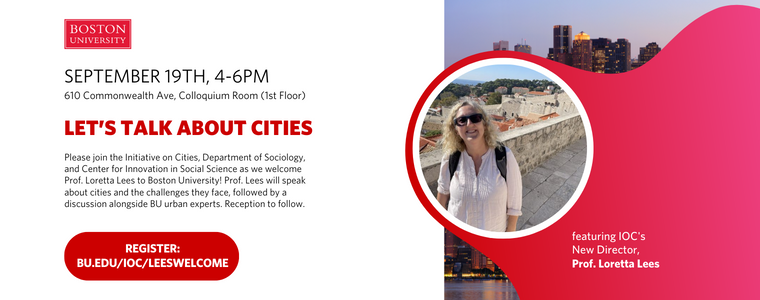Event Recap: Let’s Talk About Cities with new IOC Director Loretta Lees
Held on Monday, September 19, 2022
Recap by Dhruv Kapadia
The Boston University Initiative on Cities (IOC), Department of Sociology, and Center for Innovation in Social Science welcomed Professor Loretta Lees, the new Faculty Director of the Initiative on Cities, to Boston University. An urban geographer committed to justice, Lees is internationally known for her research on gentrification, global urbanism, and urban social theory. She is also the author of multiple books, with her most recent being Defensible Space on the Move, which examines the policy mobility of urban housing redesign that inhibits criminal behavior from the US to the UK. Professor Lees comes to BU from the University of Leicester (UK), where she worked for nine years as a professor of human geography and director of research.
Throughout her presentation, Lees discussed her personal approach to the Initiative on Cities, the importance of cities in today’s ever-changing world, and her uniquely globalist perspective on urban policy and research. The event concluded with a Q&A session with a panel comprised of urban experts Maxwell Palmer, an associate professor of political science at Boston University, Japonica Brown-Saracino, an associate professor of sociology at Boston University, and Katharine Lusk, the Co-Director of the IOC.
Lees’s approach to the IOC
Lees opened her dialogue by defining what the Initiative on Cities means to her. According to Lees, the IOC’s title of “Initiative” differentiates it from ordinary institutes or centers. Instead, to her, initiative means proactively “taking the lead to solve problems,” a mission that requires energy, enterprise, and power.
The latter half of the IOC’s name also received a nuanced definition, with Professor Lees expanding on ordinary definitions of cities. Drawing from geographer Phil Hubbard’s definition of cities in his 2006 book City, Lees stated “the city is many things: ‘a spatial location, a political entity, an administrative unit, a place of work and play, a collection of dreams and nightmares, a mesh of social relations, an agglomeration of economic activity, and so forth.’”

Cities’ Importance to the World
Building on her previous definitions, Lees went on to highlight the critical importance of cities to the world today. According to Lees, cities are where we “make ourselves citizens,” asserting that cities are fundamental to civic engagement, interpersonal socialization, and the broader functioning of society.
She expands on this assertion, claiming that cities are a “crucible” for the future of democracy. While she acknowledged that democracy is also undermined in cities, Lees touched on ideas from her book The Emancipatory City?, arguing that cities’ diversity encourages civic engagement. “We urgently need to re-establish the city as the driver of democratic politics with an emancipatory agenda,” said Lees, “rather than one that ratifies the status quo or gets mired in a dystopic post-justice city.”
The Global Urbanist Perspective
Lees transitioned her discussion to the importance of understanding cities on an international level, citing her eye-opening experience when studying gentrification and its effects in different countries. She then outlined the characteristics of a global urbanist, which involves approaching the study of urban politics and policy in an internationalist framework. More broadly speaking, a global urbanist researches for the sake of urban social justice, engages with policy and policy makers and people on the ground, and collaborates with fellow urbanists around the world. Lees also described the three fundamental issues facing both Boston and cities across the globe today: economic sustainability, environmental sustainability, social sustainability.
She concluded her talk by highlighting the importance of studying, understanding, and improving cities, saying that “this century, even more than the last, will be an urban one, in which the city is the measure of civility and sustainability of society.”
Panel Q&A
Lees then opened discussion to a broader panel of urban policy experts, first asking what the IOC should be doing more of for the city of Boston. Professor Maxwell Palmer answered, highlighting the IOC’s current and ever-expanding offerings of the MetroBridge program, the Menino Survey of Mayors, and internship programs for both graduate and undergraduate students as examples of meaningful initiatives that engage faithfully and productively with the city of Boston.
 Professor Japonica Brown-Saracino answered more broadly, asserting that the Initiative on Cities should expand student and faculty opportunities beyond Boston to other cities in the greater regional area. “The relationship between different communities are so close and impactful,” said Brown-Saracino, “[and] the choices we make at BU impact neighboring cities.”
Professor Japonica Brown-Saracino answered more broadly, asserting that the Initiative on Cities should expand student and faculty opportunities beyond Boston to other cities in the greater regional area. “The relationship between different communities are so close and impactful,” said Brown-Saracino, “[and] the choices we make at BU impact neighboring cities.”
Lees transitioned to a “cheekier” question, asking Katharine Lusk, a former Policy Advisor to late Boston Mayor Tom Menino, how newly-elected Mayor Michelle Wu will be different from her predecessors in creating change for the city of Boston. Lusk cited Mayor Wu’s diverse Cabinet appointments and strong political will as reasons to expect progressive change. “Mayor Wu is tapping talent that has long resided in the city,” said Lusk, “[and] having the right team in place…that can fight the fight” will allow her to address long standing issues facing Boston.
The Q&A session concluded with an audience question asking about BU’s current contribution to Boston’s ever-developing issue of gentrification. Professors Palmer and Brown-Saracino touched on the vital role universities and students play in Boston’s urban development, a role that oftentimes facilitates gentrification and urban sprawl.
Co-Director Katharine Lusk had a different perspective, focusing more on the inclusive and open space that BU and the IOC has tried to foster for the greater Boston community. “[Boston University] is not a walled off space [and] we’ve tried to bear that out in our work,” said Lusk, “we really ask ourselves how we can be expansive and inviting folks to campus, while also having relevant topics and programming.”
